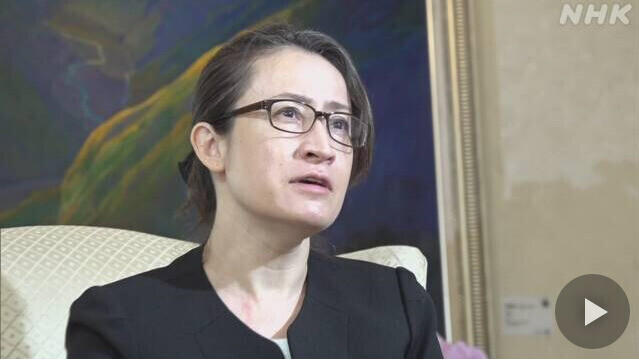hankyoreh
Links to other country sites 다른 나라 사이트 링크
Taiwan’s envoy to US says a democratic Taiwan is in the interest of all democracies

“It is in the interest of all democracies that Taiwan remains democratic,” said Hsiao Bi-khim, Taiwan’s de facto ambassador to the US.
Hsiao is participating as Taiwan’s representative at the Summit for Democracy, which has been taking place Thursday and Friday over vehement objections from Beijing.
In a Thursday interview with Japan’s NHK news network just ahead of the summit, Hsiao said that Taiwan’s participation in the summit will allow it to “widely share our successful experiences with democracy to date.”
“China continues to propagate the narrative that democracy isn’t suitable for Asian countries or for Hong Kong, but Taiwan proves that is wrong,” she added.
She also said, “Taiwan’s survival and our security is a cornerstone of the peace and stability of the Indo-Pacific region.”
Hsiao argued that the very existence of Taiwan as a successful democracy even under intense pressure from China is a great “tangible and intangible asset” for all democracy advocates.
Noting that Taiwan has achieved great successes in its battle against COVID-19 through the sharing of information and use of digital technology, she added that Taiwan’s advancements in digital technology have allowed the country to promote citizen participation through democratic procedures.
“We look forward to being able to use the Summit for Democracy as a space for sharing expertise,” she said, signaling her commitment to take part in the event.
Taiwan remained under martial law for a nearly 40-year period after the Kuomintang party relocated to a provisional capital in Taipei in December 1949 following its defeat in the Chinese Civil War.
Martial law was finally lifted in July 1987, and Taiwan held its first direct presidential election in March 1996. It has maintained a stable democratic system since then, including a successful democratic change in administrations in 2000.
The US’ surprising inclusion of Taiwan on the list of invitees to the Summit for Democracy on Nov. 23 triggered a major outcry from China.
Shortly afterward, the Taiwanese Presidential Office expressed “thanks to President [Joe] Biden and the US government for inviting Taiwan.” At the same time, it announced that Audrey Tang, who is Taiwan’s digital minister, and Hsiao, who represents Taiwan in the US, would be attending the summit in President Tsai Ing-wen’s stead.
In its analysis of the decision on Sunday, Japan’s Nikkei newspaper said, “If President Tsai had participated even in a videoconference, that would have crossed a ‘red line’ for China that would have made an intense military backlash unavoidably.”
“Taiwan did not cross that line,” it concluded.
By Gil Yun-hyung, staff reporter
Please direct questions or comments to [english@hani.co.kr]

Editorial・opinion
![[Column] The state is back — but is it in business? [Column] The state is back — but is it in business?](https://flexible.img.hani.co.kr/flexible/normal/500/300/imgdb/original/2024/0506/8217149564092725.jpg) [Column] The state is back — but is it in business?
[Column] The state is back — but is it in business?![[Column] Life on our Trisolaris [Column] Life on our Trisolaris](https://flexible.img.hani.co.kr/flexible/normal/500/300/imgdb/original/2024/0505/4817148682278544.jpg) [Column] Life on our Trisolaris
[Column] Life on our Trisolaris- [Editorial] Penalties for airing allegations against Korea’s first lady endanger free press
- [Editorial] Yoon must halt procurement of SM-3 interceptor missiles
- [Guest essay] Maybe Korea’s rapid population decline is an opportunity, not a crisis
- [Column] Can Yoon steer diplomacy with Russia, China back on track?
- [Column] Season 2 of special prosecutor probe may be coming to Korea soon
- [Column] Park Geun-hye déjà vu in Yoon Suk-yeol
- [Editorial] New weight of N. Korea’s nuclear threats makes dialogue all the more urgent
- [Guest essay] The real reason Korea’s new right wants to dub Rhee a founding father
Most viewed articles
- 1[Column] Why Korea’s hard right is fated to lose
- 2Amid US-China clash, Korea must remember its failures in the 19th century, advises scholar
- 3[Column] The state is back — but is it in business?
- 4[Column] Life on our Trisolaris
- 5[Guest essay] Maybe Korea’s rapid population decline is an opportunity, not a crisis
- 6AI is catching up with humans at a ‘shocking’ rate
- 7[Column] Can Yoon steer diplomacy with Russia, China back on track?
- 860% of young Koreans see no need to have kids after marriage
- 9[Editorial] Yoon must halt procurement of SM-3 interceptor missiles
- 10OECD upgrades Korea’s growth forecast from 2.2% to 2.6%